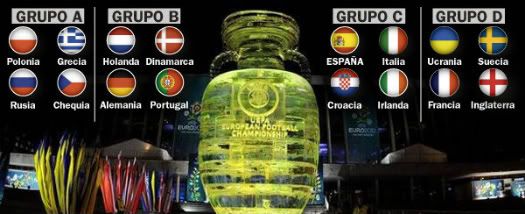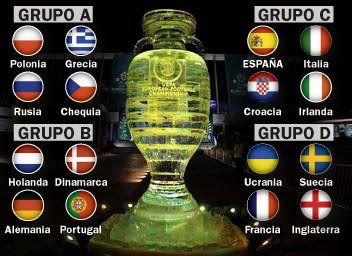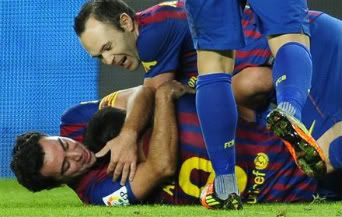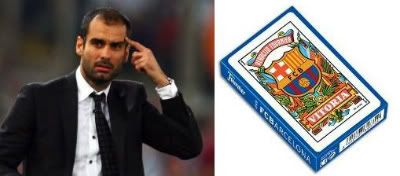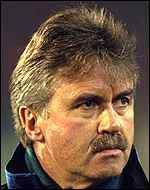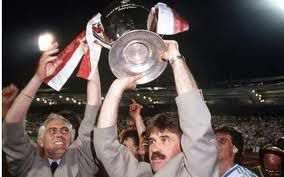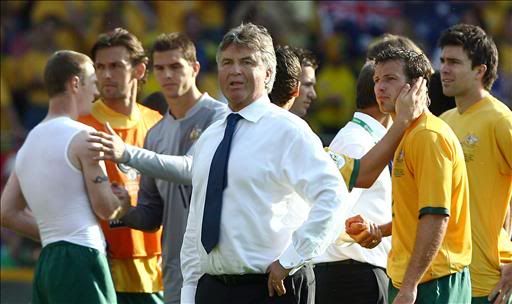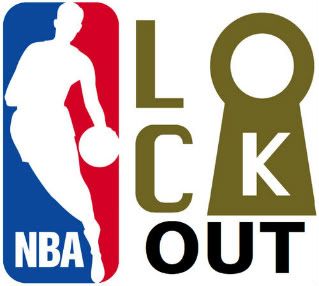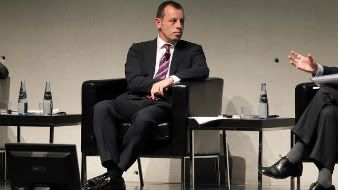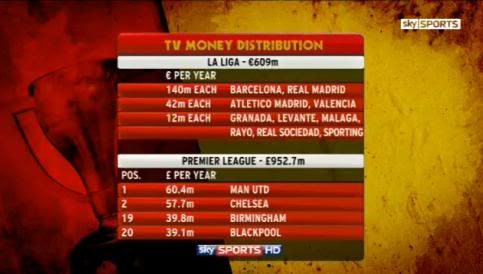
Today, we bid farewell to 2011. For us Barça fans, 2011 was another great season that came close to matching 2009. The team was in contention for another treble but managed to win another double by capturing their 21st league title and their fourth ever UEFA Champions League title. They then started the new season by winning both the Spanish and UEFA Super Cups before finally winning their second ever FIFA Club World Cup title. 2011 also saw FC Barcelona face Real Madrid an astonishing seven times with their lone defeat coming in the Copa Del Rey Final as they won three and drew three. 2011 was also an impressive season for the players as Messi, Iniesta and Xavi were finalists for the FIFA Balon d’Or while Valdés won another Zamora trophy along with Messi, Xavi and Valdés reaching historic club milestones. So without further delay, here is the 2011 year in review of FC Barcelona.
January
January ushered us into the New Year and it kicked off with Xavi becoming Barça’s all time leader in appearances. Xavi would then head to Switzerland with fellow teammates Iniesta and Messi for the FIFA Balon d’Or award ceremony. This marked the first time since the Milan team of the late 80’s that the three finalists for the Balon d’Or came from the same team. In a somewhat surprise announcement, Messi beat Xavi and Iniesta to capture his second consecutive Golden Ball. Additionally, six Barça players were in the UEFA.com team of the year.
January also saw Barça compete in three different ties in the Copa Del Rey. Barça eliminated Athletic Bilbao thanks to an important away goal from the most unlikely source, Abidal. The final score of 1-1 was enough for Barça to advance after ending the first leg in a scoreless draw. Barça then succeeded in scoring two consecutive 5-0 routes in the first legs of their Copa Del Rey Quarter-Finals and Semi-Finals against Real Betis and Almeria.
January also saw Busquets sign an extension to remain with the team while it was announced that Thiago was going to be promoted to the first team next season. Thiago’s brother, Rafinha, also earned a promotion as he made the leap to Barça B. The month would also be marred after Captain Puyol suffered an injury that would plague him for most of the second half of the season. January was also the month when the rumors of Barça coming to Miami for a summer friendly. Rumor had it that Barça would be coming to Miami in the summer to face AC Milan. That would later turn out to be false regarding Barça’s opponent only.
February
February kicked off with back to back 3-0 wins against Almeria, with new winter signing Ibrahim Afellay scoring his first goal for the club, and Atlético Madrid with the latter result setting a new league record of 16 consecutive league wins. The club also announced the new rules for fans to become club members and was not embraced by some of the Blaugrana faithful. This month also saw the club see Xavi go down with injury. Xavi would bounce back but Puyol’s injury from last month would mean he would miss the away 1-1 draw to Sporting Gijon. Four days later, Barça would suffer an unjust 2-1 loss away in London to Arsenal in the first leg of the Round of 16 Champions League knockout stages. The month ended on a good note as the club bounced back with a win against Mallorca but the bigger news was the announcement that Guardiola would be back next season as Barça’s manager.
March
March saw the return of Xavi for the important encounter against Valencia as they managed to win away 1-0 in a game that featured Guardiola coaching with lower back pains. Following that victory, Guardiola was rushed to the hospital in Barcelona to seek treatment for a spinal disc hernia. Guardiola would return to manage the return leg against Arsenal that saw the team victorious 3-1 thanks to a Messi brace with the first goal ending up being nominated for goal of the year by FIFA. No doubt Van Persie’s sending off was crucial but Mascherano’s last ditch tackle on Bendtner to deny him a golden scoring chance will be forever remembered.
Barça though were rocked after doping allegations from a radio station in Madrid following their exciting 1-1 draw away to Sevilla. The report linked the club, along with Valencia to doping practices by its medical staff. The club released a statement on their official site denying the negative allegations and demanded an immediate retraction along with the threat of legal action in order to defend the club’s name and honor. Cadena COPE did later apologize for the report but did not retract the report. The reporter who made the allegation further explained that the information came from Real Madrid.
Barça’s month though took a turn for the worse a day later when the club announced that defender Abidal was out indefinitely with a liver tumor. This announcement rocked the football world and shocked Barça fans who were witnessing Abidal fill in superbly in Puyol’s absence as a center back. Additionally, it was also announced that Barça B manager, Luis Enrique would be leaving the club at the end of the season where he would end up taking the Roma position. The end of the month saw another Barça defender in the news, but for a good reason, when the club announced that the beloved Dani Alves signed a new deal to remain with the club. It was also unveiled that Barcelona would be facing Manchester United in a summer friendly on US soil.
April
By far, April was the most important month of 2011. April saw Barça extend their league lead to eight points following Real Madrid’s surprising loss at home to Sporting Gijon. This was a great way for the club to kick off a new month and they followed that up with an impressive 5-1 victory over Shakhtar Donetsk at the Camp Nou in their first leg of the Champions League Quarter-finals that all but assured that Barça were heading to yet another Champions League Semi-finals. With Real Madrid also victorious in their first leg against Tottenham, an El Clásico Semi-finals were on the horizon which meant that April would become the month of El Clásico with four scheduled matches between the arch rivals.
Barça all but sealed the league in the first El Clasico of the month when they went to the Bernabéu and managed to hang on for a 1-1 draw which saw both Messi and Ronaldo score from the spot. This game also saw the return of the captain, Carles Puyol, for the first time in months from his injury. The second encounter between the two rivals a few days later would end in disappointment for Barça fans as an extra-time goal from a Ronaldo header was enough to win the Copa Del Rey. Puyol did not feature in this encounter but was on the substitute’s bench. Mourinho had won his first title as a Real Madrid manager with his team being criticized by the Cules as too dirty and physical. Guardiola promised that his team would recover and his team did when they defeated Osasuna 2-0 in league action.
Barça then had to prepare for another trip to the Spanish capital for the third battle against Real Madrid; this time in European competition. Prior to kick off, Guardiola went off on Mourinho in a press conference that caught the Spanish media by surprise. His fiery words were welcomed by his players who were rumored to have given their manager a standing ovation. The first leg saw both teams play to a scoreless draw before the tides turned when Pepe was sent off for a foul on Dani Alves that still has people talking about it to this day. Messi would then grab a brace with the first goal coming from a well timed tap in courtesy of a well delivered cross from the Dutch substitute Afellay. Messi’s second goal would be one for the ages as he managed to dribble past four Madrid players before slotting the ball past Casillas.
Many believed that the two goal deficit all but assured that Barça would be going to another Champions League final. Even Mourinho said as much in his much mocked press conference following the defeat that saw him get sent off to the stands following Pepe’s red card. Barça’s culmination to a wonderful month came to a disappointing end when they suffered their first away loss of the season and their first loss since September by losing to Real Sociedad. Fortunately, Real Madrid also suffered another loss at home to by falling to Real Zaragoza which kept Barça’s lead atop of the standings to remain at eight points.
May
Of course there were going to be some fallout after Barça’s 2-0 win in Madrid and both clubs lodged protests with UEFA. One of the big issues was the accusation that Busquets uttered a racial slur towards Marcelo. It caught everyone a bit off guard and the video evidence from Madrid was murky at best which was ridiculed by many Blaugrana fans. After all the protesting and whining, the second leg kicked off with Mourinho relaxing in his hotel room. The first half ended in a scoreless draw and the second half saw Madrid had a goal disallowed which brought the chants of “Por Que?” from the Barça fans who were mocking Mourinho’s rant. The game would end in a 1-1 draw with Pedro’s goal being the nail in the coffin to give his side a temporary 3 goal aggregate lead before Marcelo reduced it back to a 2 goal aggregate lead. This result meant that Barcelona would be going back to Wembley for a second time for a shot at winning the Champions League trophy for a 4th time. What made this result even more memorable was the unexpected return of Abidal when he came on as a substitute in the dying seconds of the game. He would feature in the next four matches leading to up to the Champions League final.
Barça then shifted their focus on their league campaign and defeated their derby rival Espanyol 2-0 before traveling away to Levante and left with a 1-1 draw. That draw meant that the club had clinched their third consecutive league title and 21st in club history. With the league title secured, Guardiola had 13 days to prepare for Manchester United and rested most of his starters against Deportivo La Corona, which ended in a goal less draw, and away against Malaga, which ended in a 3-1 victory. This month also saw the club unveil the new kits for the next season.
The big day arrived on May 28th as Barça were back in Wembley for the first time since 1992. The venue was where Barça captured its first ever Champions League title back when it was called the European Cup. This game saw Puyol on the bench but Abidal was in the starting lineup. Barça struck first with Pedro scoring early in the first half. Wayne Rooney scored the equalizer as both teams entered the half even at one goal apiece. The second half though would belong to Barça as they clinched their fourth ever Champions League title with Messi scoring the go ahead goal with a well taken effort from outside the box and soon afterwards, David Villa sealed the outcome with a beautiful curling shot. All three forwards scored from assists from each midfielder. The victory was further remembered after Puyol’s classy gesture of handing over the captain’s arm band to Abidal which allowed the French defender to hoist the Champions League trophy.
The season came to a wonderful end and the team celebrated in grand fashion. No doubt that this was Guardiola’s best performance as Barça’s manager and his team had eclipsed the “Dream Team” as the best in the history of the club. On the last day of the month, the club announced the team would be playing its first preseason friendly away in Croatia.
June
The month of June meant vacation for most of the players and the fans. The South American players however had to get ready for Copa America. It was a busy month for the club though as they announced the news that former Barça player and Rijkaard assistant coach, Eusebio, was going to replace Luis Enrique as Barça B’s manager. President Rosell was also busy when he came out with a statement warning Real Madrid over their conduct during the season which prompted Real Madrid to respond back. Rosell also saw to it that Thiago would sign a new deal to stay with the club. On a personal note, I was fortunate to fly down to Miami and relax. I also got to cover Miami’s version of el Clásico between two local teams under the guise of Barça and Real Madrid that featured some of the Miami Penya players representing Barça.
July
Barça kicked off July by signing Pedro to a new contract, finalizing the transfer of Alexis Sanchez from Udinese and the transfer/loan of Bojan to Roma. The club also announced that they would be hosting Italian side Napoli in their annual Gamper Trofeo friendly. Barça also kicked off their summer preseason with a victory in Croatia against Hadjuk and also capturing the Audi cup after defeating Brazilian club Internacional and the hosts Bayern Munich. Thiago shined in the Audi Cup while the team suffered some bad news after Barça B player, Jonathan Soriano, suffered a serious injury that would see him miss most of the first half of the season.
With the club getting ready to tour the US, Guardiola opted not to call up any of his South American players with the exception of Adriano. Guardiola’s roster for the US tour thus consisted of first team and Barça B players. UEFA also announced their top three players in contention for their Player of the year award with Messi and Xavi competing against Ronaldo for the award.
August
August would see Barça kick off their US tour with a loss to Manchester United in Washington D.C. with Ibrahim Afellay also suffering an injury that would force him to be out of action for a while. August would also be a very busy month for Barça Penya and Barça fans in Miami with the city hosting Barça’s second match of the US tour. The Penya members and fans had many events to look forward to and I was back in Miami again for all the festivities.
We first had Iniesta and Busquets appear at the Soccer Locker and take questions from fans in a packed Soccer Locker. Afterwards, Guardiola gave a press conference at the team’s hotel. Unfortunately, I missed the interview but I and my friend Alex managed to bump into Abidal and Keita and club delegate Carles Naval at the hotel. I also was lucky to meet other Barça fans such as Edwin at the hotel who were hoping to get a chance to meet the Barça players and was glad to know that Edwin and others were successful in meeting some of the players.
The club also had another event lined up that same day for a charity event featuring the wonderful Shakira and some of the club players such as Busquets, Puyol and Pique. Other club officials were present for this event, including the sporting director Zubizarreta, and Penya president Rafael Escofet got a chance to converse with them all. The following day saw some of the players get to swim with the dolphins at the Miami Seaquarium. The evening would be even busier for the fans as the club had scheduled a late training session that coincided with a Penya dinner honoring Barça VP Jordi Cardoner i Casaus.
The training session was not open to the public and required a ticket for admission but kudos to the many fans whose presence and passion along with determination forced stadium officials to allow the fans in to see their players train. The dinner was also a success with gifts exchanged between the Penya and the club. There was also great Catalan food while the guests were entertained with the most recent Champions League final being replayed on a big screen. However, the biggest surprise of the evening was the Champions League trophy itself being present for everyone to enjoy. Many, including myself, made sure to get as many photos with that cup in this once in a lifetime situation. It was a wonderful night where I got to meet some new members of the Miami and Chicago Penya.
The game the following day against Chivas was not so memorable as Chivas defeated Barça 4-1. Muniesa suffered an injury and many fans were upset by what they had witnessed. I understood their frustration at the outcome but I didn’t think their anger was justified. It was a friendly and Pep had more things to worry about, such as the Supercopa. Barcelona concluded their US tour with a 2-0 over America. The club would then announce that Milito, Jeffren and Barça B starlet Romeu would be leaving the club.
Barça returned to Spain to face off against Real Madrid for the Supercopa. The first leg was in Madrid and saw Guardiola start some of the South American players who had not played in any of the summer friendlies. The first leg ended in a 2-2 draw that saw Barça came back from being a goal down with Villa and Messi scoring to give their side a 2-1 halftime lead. A Xabi Alonso goal in the second half was all the goals scored in the second half. The club then announced the transfer of Cesc from Arsenal that finally ended a pursuit that had been in the works for many years. The second leg would be an electric and feisty affair that saw both teams go back and forth before Messi sealed the outcome with his second goal with three minutes left in the game. The game then turned ugly when a melee occurred after Marcelo saw red for his rough challenge on the substitute Cesc, who was making his debut in the final minutes of the game. Players were pushing each other and in one incident, Mourinho was caught by the cameras trying to gouge Guardiola’s right hand man, Tito Vilanova, which resulted in Vilanova retaliating with a shove at Mourinho too.
In the end, Barça got to celebrate another title against their arch rivals. The team would then defeat Napoli 5-0 in the Gamper Trofeo before traveling to Monaco to face Porto for the UEFA Super Cup. The night before the game, Messi was awarded the inaugural UEFA Best Player in Europe Award and the team was grouped with Milan, BATE and Plzen in their Champions League group. Pique would suffer an injury during training and would miss the game. His absence would not haunt the club as Messi opened the scoring after being the beneficiary of a poor back pass and then assisted on Cesc’s goal to seal the outcome for yet another title for Pep. Barça then kicked off their domestic season with a 5-0 drubbing of Villarreal. The month ended on a high note when the Penya president, Rafael Escofet, was a guest on the Jorge Ramos y Su Bands show with the L.A. Real Madrid Penya president in an unforgettable and engaging discussion.
September
September saw the club hold its General Assembly where all proposals brought forward by FC Barcelona were approved such as the Qatar Foundation sponsorship deal. This month would see Messi and Valdés reach new milestones as Messi surpassed Kubala to be second in the club’s all-time scorer’s list while Valdés became the most capped keeper in club history. However, Valdés’s milestone came in a game where Barça squandered a two goal lead in San Sebastian in a disappointing 2-2 draw to Real Sociedad. A few days later, Barça would witness another match where they squandered yet another lead when they conceded goals against Milan in the first seconds and last seconds of the game in another 2-2 draw. Barça would rebound and demolish Osasuna 8-0 and then play to an exciting 2-2 draw away against Valencia. The club ended the month with back to back 5-0 victories against Atlético Madrid and Bate with the latter being the match where Messi set his milestone.
October
October was a good month for the club where they managed five victories out of six. Their only non-victory was the goalless draw at home to Sevilla. Messi had a chance to get his side the three points in the end but his penalty effort was saved by the keeper, Varas, who played a great game. The only other issue that month was Barcelona B's slow start under Eusebio. Barça B are not duplicating last season’s form and results and it shows in the current standings. Barça would end the month of October without conceding a single goal but also unveil another young starlet, Isaac Cuenca. Cuenca’s rise through the ranks was impressive after rejoining the club during the summer. Cuenca was only a month into his debut with Barça B before injuries forced Guardiola to call him up to join the first team. He came on as a substitute against Plzen and scored his first ever team goal against Mallorca. The young player made the most of his opportunities and impressed Pep enough to make sure he would remain with the first team.
November
November would see Barça drop more points with another 2-2 draw away this time to Athletic Bilbao. It was a great game but the result did not help their league standings. Barça then won their first leg of the Copa Del Rey against L’Hospitalet 1-0 thanks to a wonderful goal from Iniesta and also defeated Zaragoza. The team then made the journey to Milan where they were victorious 3-2 in a thrilling encounter with former Barça player Van Bommel scoring an own goal before another former Barça player, Ibrahimovic, tied things up 1-1. Messi then scored the go ahead goal but Milan tied things up again in the second half courtesy of a great goal from Boateng. Fortunately, Xavi grabbed the winner courtesy of a sublime through ball from Messi. This result meant that Barça were going to finish as group winners.
This month also saw club president come out with the suggestion that the league should be reduced to 16 teams that was ridiculed by some but I agreed with his suggestion. Barça’s good fortune would not last long as they would suffer a huge setback when they lost away to Getafe to fall behind Real Madrid by 6 points. Many fans were upset, including myself, but the season was far from being over. The team rebounded back when they defeated Rayo Vallecano 4-0 in game pushed forward because of the club’s participation in the FIFA Club World Cup. That victory reduced the gap back to three points.
December
December kicked off with the finalists of the FIFA Balon d’Or being announced and it was the exact duplicate of the UEFA award with Ronaldo, Xavi and Messi being selected as finalists again. The team also kicked off the month with impressive back to back victories over Levante and BATE with the Barça youth shining against the latter in a 4-0 victory. This meant that Barça headed to Madrid to face their bitter rival knowing a victory would temporarily eliminate the gap between the two teams atop of the standings. A loss on the other hand meant that Madrid could easily be ahead of Barça by nine points before the New Year.
El Clásico was another classic for the Blaugrana fans although it kicked off in nightmare fashion when Madrid scored in the first 30 seconds by Benzema. Valdés was to blame for the poor pass that was intercepted and lead to the goal although that could have been because of the lasers being pointed at his eyes. Nevertheless, Barça fought back and a moment of great skill from Messi set up Alexis who equalized to end the first half 1-1. The second half would be all Barça with Madrid ruing their misfortune. Xavi saw a shot take a deflection off of Marcelo that allowed the ball to get past Casillas for the go ahead goal. Later, after Ronaldo missed a golden scoring chance with his header going wide, Barça went down the field and doubled their lead when Cesc headed in a Dani Alves cross to all but seal the victory.
A great result for Barça as they scored an impressive victory against a very confident Madrid side and also taught us a lesson in never doubting the hearts of a champion. Barça would now shift their focus to the FIFA Club World Cup as they traveled directly from Madrid to Japan and trounced Qatari side Al-Sadd 4-0 to reach the final against Brazilian side Santos. The game was marred though with the news that David Villa would be out for probably five months after suffering a serious leg injury. While the club was away in Japan, UEFA held its draw for the Round of 16 knock out stage and Barça’s next opponent would be German club Bayer Leverkusen.
The final the world waited for kicked off a few days later with Barça facing Santos for the first time in a competitive fixture. The final was dubbed as Messi v Neymar but the final was over by halftime as Barça raced to a 3-0 lead with Messi, Xavi and Cesc scoring in the first half. For Messi, the goal meant he scored in 5 of the 6 club competitions this season, with only the Copa Del Rey left in his path. On the other hand, this goal also meant that Messi scored in all 6 club competitions in 2011. Messi would score another goal in the second half for a 4-0 victory that meant Barcelona had won its second ever FIFA cup and Guardiola picked up his 13th title as manager of FC Barcelona.
Back in Spain, Real Madrid defeated Sevilla to end the year on top of the Spanish league by three points. Barça flew back to Barcelona with just one game left to end a successful 2011. Barça hosted L’Hospitalet in the second leg of their cup and with the South American players already away on vacation. This meant that Pep had to field a roster full of Barça B players which would not hurt the team’s chances. Quite the contrary, the match saw some of the young players raise to the occasion as they defeated their opponents 9-0. The match was marred with another injury with Iniesta having to come off in the first half but fortunately his injury was not going to make him miss any matches due to the winter break.
So 2011 is coming to an end and boy has it been a great year for us Barça fans. Just one title away from another treble and who knows what we have in store for 2012. We saw players overcome tough adversity in terms of facing their bitter arch rival and also overcoming serious health scares. Even Guardiola suffered a health scare with his back problems with some joking that the pain was caused from Pep carrying the club on his back for the past few years. 2011 will be one of the history books but 2012 is shaping to be another interesting year for the club. We already know that there is a possibility that Barça could face Real Madrid in the Quarter-finals of the Copa Del Rey if both teams defeat their opponents in the Round of 16 stage. Barça will face Osasuna while Real Madrid will face Malaga. So brace yourselves, we might kick off 2012 with 2 Clásicos by the end of January. 2011 was a wonderful year and here’s hoping that 2012 will be just as rewarding for us Barça fans.
Hope all of you guys have a wonderful and happy New Year and may 2012 be a year of happiness, success and good health.
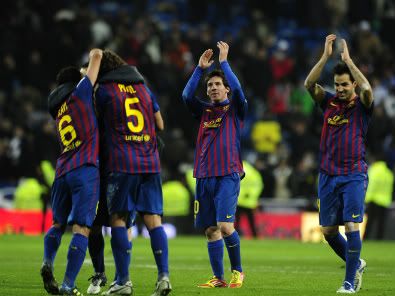
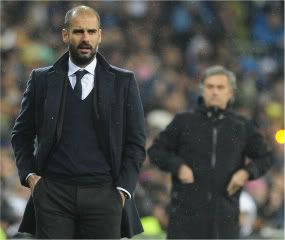
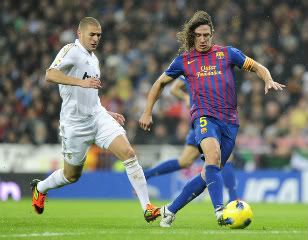
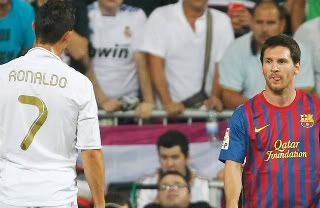
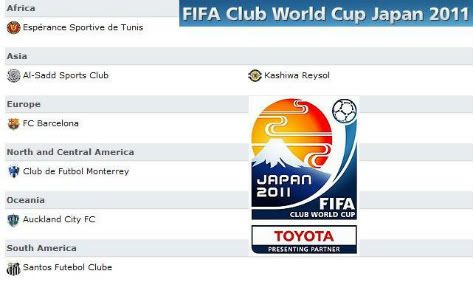
 Kashiwa Reysol (Japan)
Kashiwa Reysol (Japan)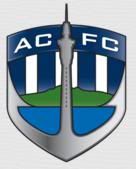 Auckland City FC (New Zealand)
Auckland City FC (New Zealand)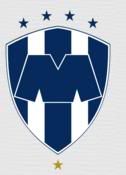 Monterrey (Mexico)
Monterrey (Mexico)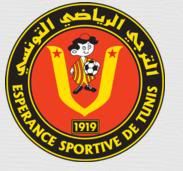 Espérance (Tunisia)Founded in 1919.
Espérance (Tunisia)Founded in 1919.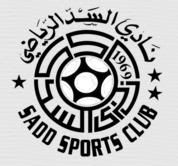 Al-Sadd (Qatar)
Al-Sadd (Qatar)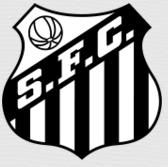 Santos (Brazil)
Santos (Brazil)